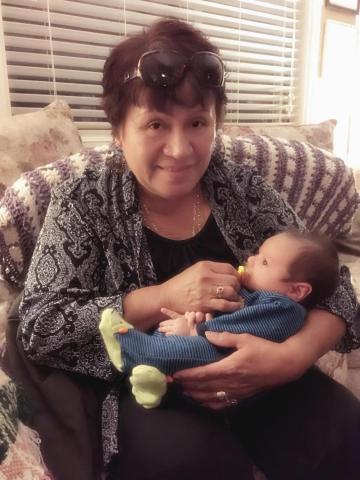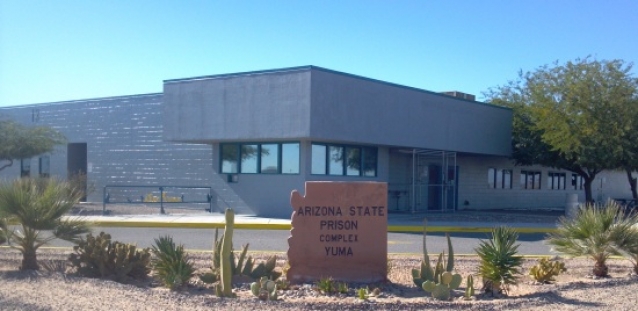Arizona Inmates And Staff “Just Trying To Survive” COVID-19
In two Arizona state prisons, understaffed correctional officers and inmates are navigating rising rates of COVID-19 infections with few resources.
 This article is part of The State of Science, a series featuring science stories from public radio stations across the United States. This story by Jimmy Jenkins originally appeared on KJZZ in Phoenix, Arizona on May 18, 2020.
This article is part of The State of Science, a series featuring science stories from public radio stations across the United States. This story by Jimmy Jenkins originally appeared on KJZZ in Phoenix, Arizona on May 18, 2020.

COVID-19 is spreading in Arizona prisons. As of May 18, more than 170 inmates have tested positive and six have died. Sixty-four correctional officers have tested positive.
Last week, KJZZ discovered that food workers contracted by the state have tested positive as well.
JoAnna Mendoza’s mother, Francisca Villar, works at the Florence prison as a food worker contracted by Trinity Services Group.
“She preps food,” Medoza said. “She works directly with inmates who are assigned to the kitchen. And she really likes her job.”
Mendoza’s mother grew concerned as the coronavirus spread in Arizona prisons, but she continued to go to work.
However, several weeks ago her mother started showing symptoms and recently was diagnosed with COVID-19.
Mendoza says despite assurances from Trinity that she would be able to apply for “quarantine time” while she was out sick, her mother’s paycheck has been reduced and she has had difficulty communicating with her supervisors.
Alex Lee, exec vice president and general counsel of Trinity Services Group, said the company “looked into the matter and our employee received quarantine pay at her full rate and did not experience any reduction.” However Mendoza disputes this claim.
Villar is one of at least four Trinity workers in Arizona state prisons to test positive. Last week, Trinity confirmed employees at the Florence and Yuma prisons had tested positive. The same week, 34 inmates, many of them kitchen workers at Yuma, tested positive as well.
Amber Bixenmann’s husband is in the Cibola Unit at Yuma. She says they have been locked down under quarantine since Friday night.
“He said it’s complete chaos in there,” she said of the most recent phone call they shared. “He said they have been bringing inmates out in stretchers and bagging all of their belongings in plastic.”
Bixenmann’s husband told her the medical unit at Yuma is completely overwhelmed.
Bianca Egurrola’s brother is an inmate worker in the kitchen of the Cibola unit at the Yuma. She says he and many other inmate workers were likely infected by a Trinity employee in the kitchen.
“We just have to put it in God’s hands because we have no control over this,” Egurrola said. “But it’s very difficult on us because they are locked down and we can’t speak to him and check in with him or provide him any comfort.”
“You know right now I don’t think it’s inmate versus staff. Right now we are all trying to come together and get through this.”
A correctional officer who works in the Cibola Unit at Yuma said his colleagues are calling in sick more frequently every day.
“At first it was two or three, now it’s like 12 or 13 people calling in each shift,” he said. “Everyone is scared because ADC [Arizona Department of Corrections] is not providing the proper PPE.”
“Last week they were giving out one box of gloves per shift,” the officer said. “That averages out to about two pairs of gloves for each officer and that’s just not enough. We can’t do our job correctly and safely.”
The most recent update from Department of Corrections shows 35 inmates at Yuma have tested positive for COVID-19.
Correctional officers are still paying for their own tests out of pocket, and the department is relying on them to self-report the results. The officer said despite believing he has been exposed, he is reluctant to get tested.
“I don’t have any symptoms, but if I go and get tested, and it comes back positive and I can’t work for a few weeks, I’ll feel like I’m letting my team down,” the officer said. “We’re already so short-staffed, I don’t want to make things worse than they already are.”
The officer said everyone at Yuma is just trying to survive.
“You know right now I don’t think it’s inmate versus staff,” he said. “Right now we are all trying to come together and get through this.”
Morale among staff is poor, according to the officer. “I wish we had more support from our administrators,” he said.

A correctional officer who works at the La Paz Unit at Yuma said his supervisors are lying to staff about how many inmates are infected with the virus.
“I was told an inmate I would be watching one day was being tested for scabies,” the officer said. “But when I spoke with the inmate he told me he was being tested for coronavirus.”
The correctional officer said the man’s test results came back positive on Saturday. “So I’ve been around this inmate for four or five days and he had it the whole time, and I’ve been without the proper protection,” the officer said. He said all officers should be provided N95 masks.
The correctional officer said he and his colleagues were being forced to work in units with infected inmates, as well as travel to other prisons to work. “Then we come back to our unit. So there has to be contamination happening,” he said. The officer said some officers based at Yuma were also being sent work at the Eyman state prison to make up for staffing shortages at that facility.
Invest in quality science journalism by making a donation to Science Friday.
“We’re very concerned. We’re frustrated,” he said. The officer said they have been promised hazard pay as compensation for working in quarantined areas, but so far he has not seen an increase in his wages.
“It’s a mess,” he said. “It feels like our bosses don’t care about us.” The officer said he and his colleagues are going to refuse to work in the quarantine units if they are not given hazard pay and the proper safety equipment.
Read and listen to the story on KJZZ. Learn about COVID-19 in prisons in our State of Science segment.
Jimmy Jenkins is a senior field correspondent at KJZZ in Phoenix, Arizona and a contributor to NPR’s Election 2020 and Criminal Justice station collaborations.